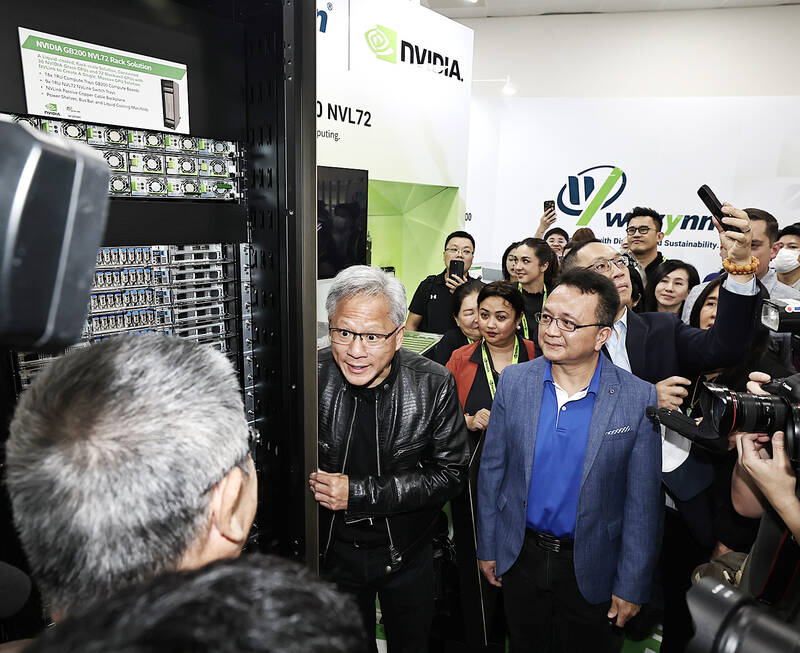Wiwynn Corp (緯穎), a developer and manufacturer of artificial intelligence (AI) servers, yesterday posted annual growth of 79.5 percent in net profit for last quarter as customers showed a strong appetite for cloud-based computing devices.
Net profit jumped to NT$4.69 billion (US$143.9 million) last quarter, compared with NT$2.62 billion in the second quarter of last year. However, on a quarterly basis, it represented a decline of 0.3 percent from NT$4.71 billion, which was an all-time high.
Gross margin improved to 10.8 percent last quarter from 8.8 percent a year earlier, but fell from 11.1 percent in the first quarter.

Photo: CNA
Wiwynn said it holds an upbeat view about cloud devices and AI-based server market demand in the long term.
To cope with business growth, the company’s board of directors yesterday approved a proposal to inject US$500 million into its US subsidiary, Wiwynn International Corp, with an aim to boost operational capital and optimize its financial structure.
The company in June said that AI servers accounted for about 20 percent of its total revenue in the first quarter and it expected rapidly growing demand would help boost the revenue contribution of AI servers to about 50 percent in the fourth quarter of this year.
At the time, Wiwynn said part of its revenue might come from servers outfitted with Nvidia Corp’s new Blackwell graphic processing units.
The company’s revenue soared 76.23 percent year-on-year to NT$31.12 billion last month, compared with NT$17.66 billion a year earlier, a company filing with the Taiwan Stock Exchange said yesterday.
Compared with NT$30.76 billion in June, revenue edged up 1.17 percent last month.
During the first seven months of the year, revenue expanded 20.27 percent year-on-year to NT$178.23 billion from NT$148.29 billion.
The AI boom is not only giving a boost to AI server makers such as Wiwynn, but also prompted chip tester King Yuan Electronics Co (京元電子) to significantly raise its capital spending in response to strong demand for testing services for AI and high-performance computing chips.
King Yuan, which provides chip testing services for Nvidia, yesterday said it plans to increase its capital expenditure to a record NT$13.83 billion for this year, from its previous estimate of NT$5.31 billion.
The company yesterday posted NT$3.27 billion in net profit for the first half of this year, up 19.78 percent from NT$2.73 billion in the same period last year.
Gross margin improved to 34.18 percent during the first half from 32.89 percent a year earlier.

WEAKER ACTIVITY: The sharpest deterioration was seen in the electronics and optical components sector, with the production index falling 13.2 points to 44.5 Taiwan’s manufacturing sector last month contracted for a second consecutive month, with the purchasing managers’ index (PMI) slipping to 48, reflecting ongoing caution over trade uncertainties, the Chung-Hua Institution for Economic Research (CIER, 中華經濟研究院) said yesterday. The decline reflects growing caution among companies amid uncertainty surrounding US tariffs, semiconductor duties and automotive import levies, and it is also likely linked to fading front-loading activity, CIER president Lien Hsien-ming (連賢明) said. “Some clients have started shifting orders to Southeast Asian countries where tariff regimes are already clear,” Lien told a news conference. Firms across the supply chain are also lowering stock levels to mitigate

IN THE AIR: While most companies said they were committed to North American operations, some added that production and costs would depend on the outcome of a US trade probe Leading local contract electronics makers Wistron Corp (緯創), Quanta Computer Inc (廣達), Inventec Corp (英業達) and Compal Electronics Inc (仁寶) are to maintain their North American expansion plans, despite Washington’s 20 percent tariff on Taiwanese goods. Wistron said it has long maintained a presence in the US, while distributing production across Taiwan, North America, Southeast Asia and Europe. The company is in talks with customers to align capacity with their site preferences, a company official told the Taipei Times by telephone on Friday. The company is still in talks with clients over who would bear the tariff costs, with the outcome pending further

Six Taiwanese companies, including contract chipmaker Taiwan Semiconductor Manufacturing Co (TSMC, 台積電), made the 2025 Fortune Global 500 list of the world’s largest firms by revenue. In a report published by New York-based Fortune magazine on Tuesday, Hon Hai Precision Industry Co (鴻海精密), also known as Foxconn Technology Group (富士康科技集團), ranked highest among Taiwanese firms, placing 28th with revenue of US$213.69 billion. Up 60 spots from last year, TSMC rose to No. 126 with US$90.16 billion in revenue, followed by Quanta Computer Inc (廣達) at 348th, Pegatron Corp (和碩) at 461st, CPC Corp, Taiwan (台灣中油) at 494th and Wistron Corp (緯創) at

NEGOTIATIONS: Semiconductors play an outsized role in Taiwan’s industrial and economic development and are a major driver of the Taiwan-US trade imbalance With US President Donald Trump threatening to impose tariffs on semiconductors, Taiwan is expected to face a significant challenge, as information and communications technology (ICT) products account for more than 70 percent of its exports to the US, Chung-Hua Institution for Economic Research (CIER, 中華經濟研究院) president Lien Hsien-ming (連賢明) said on Friday. Compared with other countries, semiconductors play a disproportionately large role in Taiwan’s industrial and economic development, Lien said. As the sixth-largest contributor to the US trade deficit, Taiwan recorded a US$73.9 billion trade surplus with the US last year — up from US$47.8 billion in 2023 — driven by strong